PART ONE ~
Bicci di Lorenzo ~ St Nicholas of Bari Banishing a Storm
~ Early Italian Art Gallery 42
I’ve got the silver-
finned blues
I’ve been painted by
a muse
They’ve labelled me
as pagan
I might as well be
Satan
For every time I sing
sublimely
I get accused
Of stirring up a
storm
When all I want to do
is warn
*****
When I see waves
a-lashing
Masts come down
a-crashing
I could make a sailor
cosy
Take him to my shell
abode-y
Down, deep under the
sea
But how can I lose
My silver-finned
blues..?
******
Here comes Father
Nicholas
Saviour of the day
He is kind and
generous
He wants me out the
way…?
If… I offer him
oysters
In the cloisters
Sing to the wind
After we’ve...
‘sinned’
Pray for his soul
St Nick, St Nick, St
Nicholas, St Nicholas
Grant this fish
This human fish
A wish
Splish! Splish!
For, how am I to form
a bond..?
One sprinkle from
your starry wand….
What! No?
He says go!
Well that’s not very
generous
St Nicholas
(Huh!)
Help me!
I am gone
I must swim on… on…
on….
And I feel
Bicci di Lorenzo
We are no longer
friends so
I think I’ll find a
different ship
I’m on my way, I’ve
had a tip
I must say ‘bye-bye’
No tear in my eye
But that’s why
I’ve got the
silver-flnned blues
I’VE GOT THE SILVER-FINNED
BLUES ~
PART TWO
Parcel -Gilt Silver
Ship ~
Michael Wellby Collection (Item 14)
Here I am with Wellby
Do you think he’ll
want to sell me?
Are you hiring
A siren?
Maybe
I won’t let slip
I’ll hide on the side
of the ship
Cruise along a table
in an elegant castle
In my silver, salver
of a silver-gilt parcel
And stopping close to
the cream
A prince, I beam
His eyes, they gleam
©Diana Moore
Poetry and pictures
at the museum ~ notes from Diana Moore
Diana says: I love
this painting, the magical quality; the dark and the light; the Saint arriving
in a blaze of stars to save the mariners;
the mermaid craning her neck upwards and swimming out of the picture… I decided to write about
it from the mermaid’s point of view as she is almost incidental in the
painting… (some people don’t notice she is there) and to experiment .. give her
a voice… and I found my poem turning into a lyric (in line with the fictional
singing mermaids) which, I feel, suited the take I had of a ‘misunderstood
mermaid’. My second performance worked
well with the introductory lines sung in blues style – and the farewell to
Bicci in tango style... A large swell of
people gathered in the gallery and I really appreciated the applause…!
I also appreciated
the help I received from the Ashmolean research team:
Dr Catherine
Wheeler, Senior Assistant Keeper, Department of Western Art
for answering my questions on the Bicci di Lorenzo painting, and
Professor Timothy
Wilson for his help with the parcel-gilt
silver ship in the Michael Wellby collection.
For information:
The Bicci di Lorenzo painting: St Nicholas of Bari Banishing
a Storm was object of the month back in 2001.
Here is a link to the painting with further information
And a note I
received from Professor Timothy Wilson
The silver-gilt ship is a late example of a
type of object that was much loved on Medieval tables as a centrepiece and
conversation piece, known as a nef. Some larger examples (there is one in the British Museum) have guns that fire and
clockwork parts.
This one is only
the most token representation of a sea-going sailing ship, but of course
European sailing ships were increasingly dominating the world’s sea routes at
the time the nef was made.
The charming
sea-equines embossed and chased on the sides are a sort of sea-creature
associated with Neptune and other sea deities of the ancient world; they
ultimately derive from classical sculpture but were much taken up by
Renaissance artists in many media. It is of course here conceived as in the
water round the ship rather than as part of the ship itself.
The inventorying of
the Wellby collection is at an early stage and I fear that is all the
information, beyond what is on the label, I can give you.
Best wishes
Professor Timothy
Wilson
Barrie and Deedee Wigmore
Keeper of Western Art


